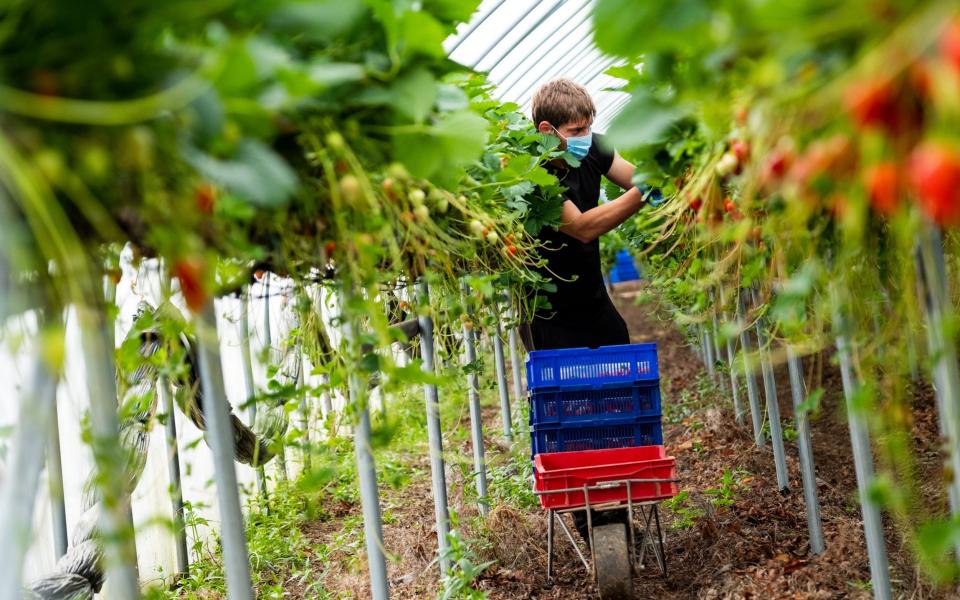Immigration minister urges fruit farms to recruit redundant workers amid fears produce will rot

Scottish fruit farmers should recruit workers who have lost their jobs due to the coronavirus pandemic for next year’s harvest rather than relying on migrants, a UK immigration minister has suggested.
Kevin Foster told The Daily Telegraph that "very few people are expecting a general labour shortage next year" and urged fruit farmers to look to the domestic market for fruit pickers, with the sector facing major shortages due to an end to free movement after the Brexit transition period ends.
However, Douglas Ross, the Scottish Tory leader, has warned that there is a "real risk of soft fruit going to waste in Scotland" unless the Home Office rethinks its approach and has told Boris Johnson that telling employers to look to UK-based workers to fill the void was unrealistic.
Mr Foster held talks with Scottish farmers this week, in which he set out measures they should follow to recruit skilled, permanent workers from overseas.

However, concerns remain about numbers that will be allowed in to fill temporary posts, with Scottish fruit farms traditionally relying on thousands short-term labourers, who are typically paid the minimum wage, from countries such as Bulgaria and Romania.
Asked about Mr Ross’s concerns about fruit being left to rot, he said: “In the current climate, particularly when we see the number of people who are concerned about their futures, then we should be encouraging employers in all sectors to look first to the domestic labour market, including those who come to the UK from the European Union, in the first instance for recruitment, and then turning to migration when that can’t be done.”
He pledged the number of seasonal workers allowed in under a scheme to run next year would be looked at closely. The NFU Scotland have estimated that 40 per cent of agricultural businesses could go to the wall if more workers are not allowed in, and estimated that at least 70,000 UK-wide, and 10,000 in Scotland, are needed.
Mr Foster added: “We’re certainly discussing what the number should be appropriately for next year, again, we’ll keep that under review. But looking at the economy more widely I think very few people are expecting a general labour shortage next year.”

The minister also said that there had been positive uptake in Scotland for the EU Settlement Scheme, which European nationals already in the UK have to sign up to to legally stay in Britain. He is urging those who have not yet joined the scheme to do so.
However, he rejected calls for the UK Government to devolve more control of immigration to Holyrood. The SNP have said new powers over immigration, which remains a reserved issue, could help address issues that are particularly acute north of the border.
Mr Foster added: “I know the Scottish Government have got a vision of rebuilding Hadrian’s Wall and getting England to pay for it, in an economic migration sense. But we don’t think it’s logical..
“I think many people will realise the calls from the SNP are much more driven by desire to drive separatism for Scotland than anything to do with driving success for Scotland.”
Responding to the minister’s comments, James Porter, a soft fruit grower from Angus and NFU Scotland’s horticulture chair, said fruit farmers had repeatedly pressed ministers on the need for a seasonal workers’ scheme.
A pilot held this year allowed 10,000 workers to come to the UK, although as freedom of movement still applied, significantly less signed up.
Mr Porter said approximately 10,000 workers were needed on Scottish farms alone, who usually stayed in the country for between six and nine months.
He said a survey of members found the vast majority of businesses had attempted to recruit UK workers this year, but almost eight in ten reported that their efforts had been unsuccessful.
He added: “If a fit-for-purpose seasonal workers scheme is not in place for 2021, then our members have indicated that there will be significant crop loss, with many moving out of seasonal horticulture altogether.
“This would be an unacceptable situation for what is a high-value, innovative, dynamic sector of UK agriculture which wholly supplies the domestic market with fresh, healthy, local produce for at least six months of the year.”
Mr Ross said: "I will continue to work with the UK government to get a solution that works for Scotland.
"The minister rightly identifies agriculture as a priority which is what I have been saying for some time and I’ve made strong representations to the Prime Minister and the Home Secretary on this. This issue is one of many that benefit when our two governments work together."

